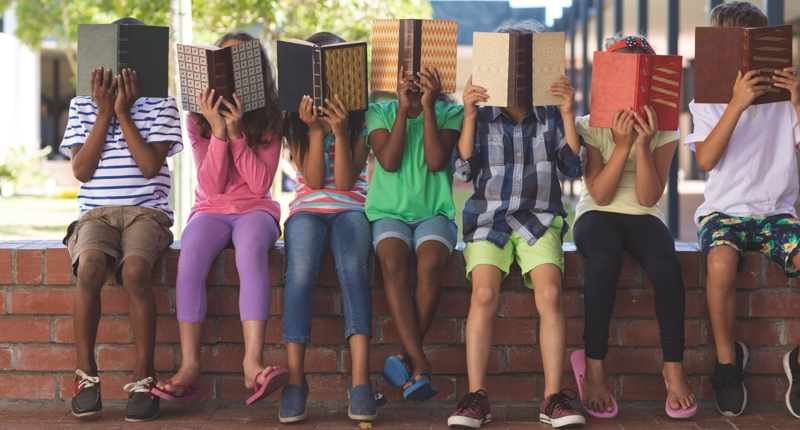The article discusses the impact of the COVID-19 pandemic on literacy development, specifically for middle-grade students. While direct impacts on literacy development are unclear, there have been indirect impacts on motivation, social contact, and emotional capacities that are essential for good school learning. The article argues that there is a need for more attention to literacy in content areas after grade four, as this is generally a neglected domain in US schools. The focus in the middle years is critical, and more discussion and consideration of alternatives are necessary in the classroom. However, the problem is that many teachers lack the tools to support them in making the necessary changes, and there is a need for a consensus on instructional components to ensure deep learning. Additionally, the article highlights the misconceptions about the science of reading, where people focus too much on phonics while neglecting other crucial components of literacy.
To Weather the “Literacy Crisis,” Do What Works
Catherine Snow, a renowned pioneer in language and literacy development, discusses the state of literacy in America in the midst of the pandemic. Despite the challenges posed by the pandemic, Snow argues that America is not currently facing a literacy crisis. She finds the public discourse surrounding a literacy crisis puzzling because the data shows that literacy scores have actually improved in the past decade.
While the pandemic has adversely affected the reading test scores of many students, there are several districts that have successfully weathered the storm. Snow cautions that the negative impact on children’s reading test scores is not evenly distributed, and we will eventually have a better understanding of its effect on literacy development. In the meantime, Snow reminds educators to remain committed to balanced literacy instruction.
Snow expresses concern that educators are misinterpreting the mode of instruction and the science of reading in the post-pandemic era. In particular, Snow warns against overloading literacy instruction with phonics in order to repair the ravages of the pandemic. Snow acknowledges that children require phonics instruction, but they do not need an hour and a half of it per day. Instead, 15 minutes of phonics instruction per day, in the context of opportunities to read, practice, and play with language, is more effective.
The EdCast episode with Snow delves deeper into the state of American literacy and the ongoing debates surrounding phonics instruction and the science of reading. Despite knowing what works, Snow argues that educators continue to misinterpret modes of instruction and the science of reading.
In conclusion, according to Snow, America is not currently facing a literacy crisis. While the pandemic has negatively impacted the reading test scores of many students, some districts have successfully weathered the storm. Snow encourages educators to maintain balanced literacy instruction, cautioning against the overloading of literacy instruction with phonics to repair the damage of the pandemic. She also stresses the importance of incorporating opportunities for children to read, practice, and play with language.
Developing Literacy Skills: A Perspective
Catherine Snow, a pioneer in language and literacy development, shares her perspective on literacy development in children. According to Snow, children who have already learned how to read, particularly those who enjoy reading, do not necessarily require literacy instruction beyond third or fourth grade. However, access to texts that help expand vocabulary, background knowledge, and skills is essential to keep their literacy skills current and growing.
Snow emphasizes that the most vulnerable children are those in kindergarten, first, and second grades. Instruction during this period is crucial to their growth, and fourth-grade NAEP outcomes for these children are yet to be seen. Snow also highlights that countries with more regular assessments experienced a loss of about a year of schooling during the pandemic, and we might see a similar outcome in our fourth-grade readers when NAEP is next applied.
Despite these challenges, Snow stresses that there is no literacy crisis in America. She finds the public discourse surrounding a literacy crisis puzzling because the data shows that literacy scores have improved over the last 10 to 15 years. Snow argues that the narrative of a literacy crisis could be a marketing technique used by companies trying to sell their programs.
While American children may not be performing exceptionally well in literacy, there is no sudden decline in literacy performance, other than the dip associated with the pandemic. Snow points out that some school districts have done an excellent job of weathering the COVID challenges. For instance, the DC public schools did not experience a drop in test scores in K, 1, or 2 over the COVID period.
In conclusion, Snow’s perspective highlights the importance of balanced literacy instruction for vulnerable children in kindergarten, first, and second grades. However, literacy instruction beyond third or fourth grade may not be necessary for children who already know how to read, as they can develop their skills through reading, access to texts, and discussions. While there are challenges posed by the pandemic, there is no literacy crisis in America, and some school districts have done a commendable job of navigating the challenges.
Impact of Pandemic on Literacy Development: Middle Years Perspective
Catherine Snow, a pioneer in language and literacy development, discusses the impact of the pandemic on literacy development for children beyond elementary years. According to Snow, while some districts have successfully weathered the pandemic without significant loss of literacy skills, there is less information available on the impact of the pandemic on middle-year children’s literacy development.
Snow argues that the negative impacts of the pandemic for older students were primarily motivational, social, and emotional, which indirectly impacted their literacy development. However, literacy development beyond third or fourth grade is a neglected domain in schools. Snow highlights new challenges that arise after third or fourth grade, such as more complex texts, language, topics, genres, and disciplinary challenges. Without appropriate instruction and skills, students are not equipped to read and learn on their own.
Snow stresses the importance of attention to literacy in content areas beyond grade four. Still, given the inadequate attention in US schools, Snow anticipates that the pandemic’s negative consequences on literacy development will have been mediated primarily through lost opportunities to learn content.
Snow emphasizes that content contributes to reading, and it is easier to read about familiar topics. The lack of attention to literacy in the content areas in middle-year children’s education is a significant challenge. Snow highlights that conceptualizing content as just conveying information without providing the skills to read and learn on their own is a mistake.
In conclusion, Snow’s perspective highlights the indirect impact of the pandemic on middle-year children’s literacy development through motivational and social mechanisms. Snow stresses the importance of attention to literacy in content areas beyond grade four and providing the necessary skills to read and learn on their own. With appropriate instruction, students can develop the necessary skills to read more complex texts, languages, topics, genres, and disciplinary challenges.
Consensus on Literacy Development
Catherine Snow, an expert in literacy development, discusses the challenges of achieving a consensus on what works for literacy development in American schools. While there have been many debates and attempts to identify the components of effective literacy instruction, Snow argues that the problem is not achieving consensus but rather implementing it in a way that integrates attention to the different skills required for reading and writing.
Tools for Teachers
One of the challenges of implementing effective literacy instruction is that many teachers lack the tools to support them in making the necessary changes. Snow’s research has found that opportunities to enter texts, read them with an understanding of how they are relevant to big questions, and discuss those questions can be very helpful in developing literacy skills. However, this approach requires slowing down and spending more time on a topic, which is not consistent with the demands of preparing students for end-of-year tests that require coverage of material.
Challenges to Deeper Learning
Snow suggests that the assessment system, accountability system, teacher accountability, and student accountability system have all been set up to counter opportunities for deeper learning. Teachers feel pressure to follow pacing guides and ensure that students talk only as much as necessary. This makes it difficult to have discussions and open consideration of alternatives in the classroom, which is essential for deeper learning.
Neglecting Components
Snow notes that people become distressed when they think that a component of literacy instruction is being neglected. For example, some people may think that phonics is being neglected and campaign to emphasize its teaching. However, this cannot be emphasized to the exclusion of teaching other crucial skills like literature engagement and reading aloud. The challenge is to prioritize instructional components and tasks in a way that ensures that all skills are taught effectively.
Conclusion
In conclusion, achieving a consensus on what works for literacy development is not the issue. The challenge lies in implementing that consensus in a way that integrates attention to the different skills required. Teachers need tools to support them in making the necessary changes, and the assessment and accountability systems need to support deeper learning opportunities. Finally, all crucial components of literacy instruction need to be taught effectively.
The Challenges of Literacy Education: A Discussion with Catherine Snow
The COVID-19 pandemic has disrupted many aspects of education, including literacy development. While the pandemic has negatively impacted the development of older students, younger children have managed to weather the storm, thanks to the resources available to them. However, there is a larger issue at play when it comes to literacy instruction in the United States: the lack of attention given to later literacy development, starting in the fourth or fifth grade.
Neglected Domain: Later Literacy Development
Many schools assume that students who have learned how to read up to third grade can read and comprehend more complex texts without additional support. Unfortunately, this is not the case. Fourth and fifth graders face new challenges such as new kinds of texts, more complex language, new topics, and new disciplinary challenges. Teachers need to focus on giving students the necessary skills to read and learn on their own, including following arguments in history or science.
Set up for Failure: Assessment and Accountability Systems
Unfortunately, the assessment and accountability systems in place do not promote deeper learning in content areas after grade four. Teachers are under pressure to cover material quickly to prepare students for year-end tests, leaving little time for discussion and open consideration of alternatives in the classroom. Consequently, deeper learning opportunities are missed, and the negative consequences of the pandemic on students’ literacy skills have been primarily mediated through motivational and social mechanisms, with lost opportunities to learn content.
The Science of Reading: Religious Commitment or Guiding Instruction?
There is a deep commitment among educators to adhere to the “science of reading.” Still, this has led to problems in the literacy field, including a holier than thou accusatory style of discourse that hinders progress on good instruction. The science of reading has become more like a religious commitment than a science, with different people defining it somewhat differently. While there is a science of reading, it is not guiding instruction. The focus on explicit phonics instruction is essential but only part of the broader set of scientific findings and accumulation of scientific knowledge.
Teaching Reading: The Process vs. the Teaching
We know a lot about the process of reading development, but we don’t know much about the teaching of reading. Wild claims are made about American teachers not knowing how to teach phonics, or there is no phonics instruction going on in American classrooms. Unfortunately, there are no large-scale surveys or observations of American classrooms to determine the percentage of teachers neglecting or overemphasizing phonics instruction.
Conclusion
In conclusion, the challenges of literacy education are multi-faceted, and no one focus or emphasis will ensure success. Instead, teachers must use a combination of different methods and approaches, including opportunities to enter texts, read texts with an understanding of how they relate to important and big questions, and discuss those questions to think more deeply about them. However, teachers need support and guidance, and assessment and accountability systems need to promote deeper learning opportunities, rather than hindering them.
Students require multiple competencies to become proficient readers. However, these competencies are not necessarily acquired in the same order or at the same pace by all students. Thus, it is a challenging task to determine the specific needs of each student.
Don’t miss interesting posts on Famousbio









